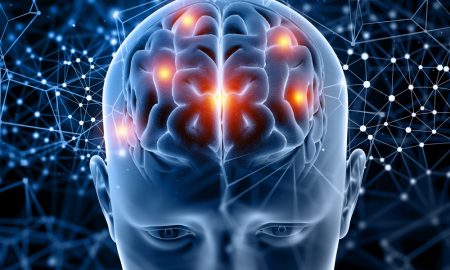
Vital Signs that Your Body is Running Abnormally Low on Magnesium

Your body acts like an assembly factory. If one component is missing or in minimal amount, then the factory won’t be able to function effectively, and might even stall. That’s why your body requires essential macronutrients every day to stay healthy.
The Importance of Magnesium
As a matter of fact, of all the minerals required by your body, magnesium is by far the most important one. Not only does it play a vital role in regulating muscle and nerve function, but also addresses your metabolism, bone health, and blood sugar too.
This is why when it becomes deficient, your body immediately experiences severe damaging effects.

YARUNIV Studio/Shutterstock
Magnesium is quite important for the body as it helps regulate quite a number of physiological factors to ensure the optimal running of the body
In fact, records released by the National Institutes of Health document that an average person requires roughly about 300 mg of magnesium every day. Fortunately, it is quite easy to supplement one’s diet with magnesium via minerals found in foods such as nuts, dark leafy greens, avocado, yogurt, and bananas.
Surprisingly, quite a number of people do not receive the recommended daily intake of magnesium. Additionally, a deficiency in magnesium is normally prevalent in people who suffer from conditions such as celiac disease, Crohn’s disease, or further suffers from insulin deficiency.
Moreover, lifestyle choices can also result in one experiencing a series of magnesium deficiency issues, especially for people who abuse alcohol on regular basis.

YARUNIV Studio/Shutterstock
Magnesium, potassium, and calcium are some of the minerals that provide essential electrolytes to ensure the nervous function is performing effectively. Hence, that is why they are considered macronutrients
That being said, here are some subtle ways in which you can notice whether or not you have a magnesium deficiency right away.
Tingly toes and fingers
Due to the fact that magnesium plays a pivotal role in nerve perception, a lack of it can result in one experiences a tingly sense, and in some severe cases, numbness. Furthermore, these sensations usually take place at the extremities, such as the toes and fingers. In fact, one feels as if their fingers have fallen asleep!
Flu-like symptoms
In severe cases of magnesium deficiency, a tell-tale sign could be flu-like symptoms; ranging from weakness, nausea, fatigue, and vomiting. Though these symptoms could also be a sign of a viral or bacterial infection, they could also be a strong indicator that you are missing magnesium from your diet.
Having a seizure without having a history of a seizure disorder
A major sign of a magnesium deficiency that is worsening over time is having an abnormal amount of seizures without having a history of them at all. If this is the case, then it means that you could be having a serious magnesium disorder. In that case, it is highly recommended that you seek medical advice as soon as possible.
Cramping muscles all the time
Due to a lesser supply of magnesium to the muscles (as is the case in pregnant women), muscle contractions can result in making the legs feel stiffer, less mobile, and much heavier.
So how does this come about? Well, as the magnesium levels in your body reduce, this results in a larger stream of calcium in the body, leading to an overexcitement of the muscles.
Constant mood swings
Abnormally low levels of magnesium in the body can result in greater levels of depression. Additionally, other signs can be increased anxiety, low emotions, and mental numbness.
A higher heart rate
As your magnesium levels plummet, your potassium levels subsequently decrease as well. Hence, the heart muscles are affected in the process, resulting in an unusual heartbeat, which can give you the feeling that your heartbeat has a much faster or slower heartbeat.
Conclusively, if you happen to experience any of the aforementioned symptoms collectively, then you might just be suffering from a magnesium deficiency. That being said, it is advisable that you seek medical attention firsthand to be effectively treated.
More in Health & Well-being
-
`
How Does the Brain Play Into Mindset? The Power of the Mindset
How does the brain play into mindset? Within the brain lies the foundation of our mindset, shaping our perceptions and guiding...
August 3, 2024 -
`
How Often Should You Meditate to Achieve Your Goals
How often should you meditate to achieve its benefits? This question is often asked by those looking to incorporate this practice...
July 25, 2024 -
`
How to Be a Better Wife? 10 Essential Tips
Marriage is a beautiful journey, a tapestry woven with moments of joy, tenderness, and perhaps even a few snags along the...
July 19, 2024 -
`
The Best Quotes About Shadow Self You Need to Read
The journey of self-discovery is incomplete without acknowledging the parts of ourselves that lurk in the dark—the shadow self. “Owning Your...
July 12, 2024 -
`
How to Make Your Wife Happy and Strengthen Your Bond
You’ve probably heard the age-old advice, “Happy wife, happy life.” But what does it really mean to make your wife happy?...
July 5, 2024 -
`
Top 6 Best Beaches in Lake Tahoe You Should Not Miss
Lake Tahoe is a gem nestled in the Sierra Nevada mountains, boasting some of the most breathtaking beaches you will ever...
June 28, 2024 -
`
6 Practical Ways of Using Social Media Less & Be More Productive
In today’s digital age, knowing how to spend less time on social media is a game-changer. Social media, though engaging, can...
June 20, 2024 -
`
How to Overcome Fear: Expert Tips and Advice
Feeling overwhelmed by fear and anxiety is a common human experience, one that often leaves us feeling trapped and uncertain about...
June 13, 2024 -
`
Here’s Everything You Need to Know About Open Relationships
An open relationship is a consensual arrangement where partners agree to engage in romantic or sexual relationships with other people. Unlike...
June 6, 2024















You must be logged in to post a comment Login